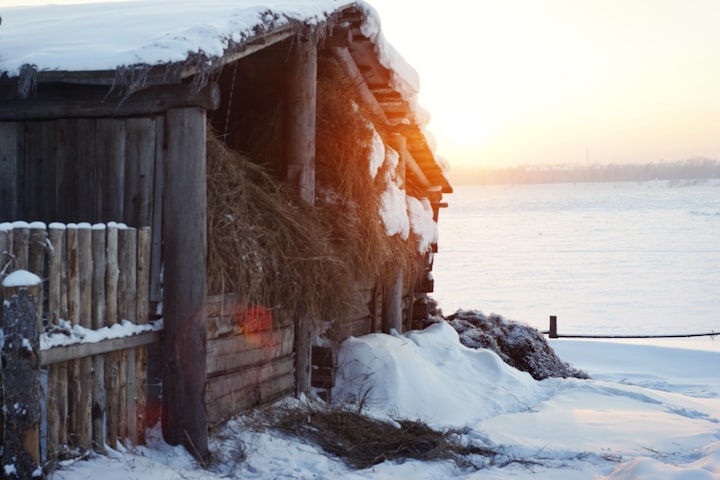The Loss of Summer
Rust and Cherry Chapstick
“I don’t know that I’ve ever been privy to such optimism before in my life, you know? To see something underneath all of that rust worth saving.” I brushed a pale fingertip over the orange rust that coated a tractor that I doubt had been thought of in the last decade. I sighed at my now russet fingertip and flicked it against my thumb and looked upward to where the tin ceiling had begun to eat away at itself. The dark gray of the sky churned above it, threatening snow. The origin of the end of this poor tractor, I assumed.
“Privy,” he scoffed, coming from around the back of it with a puzzled look on his face. “Fancy word.”
“I’m full of them,” I replied and raised a brow as he carelessly wiped his soiled hand on the leg of Wranglers that did his form a thousand wonders.
“She’s not too beat to hell, ya know. Her guts might be good, and why not? I might just need to get myself a free tractor.” He gave his hand one final slap against his leg.
“And do what with it, pray tell?” I wrinkled my nose at it as he failed to meet my gaze. His brown eyes ran over every inch of the beast of metal between us. Funny, I thought, I never imagined I would be envious of a tractor.
“Things I’m not privy to tell you,” he responded.
“That is not the correct context for that word,” I mumbled and turned my back on the tractor to rear my neck, allowing the sparse few rays of sun that streamed at odd angles through the ancient wood to warm my skin. He mocked me under his breath, and he knelt down to look at the inner workings of the thing and hummed low in his throat as he inspected it.
I rolled my eyes and looked around at the place that now seemed foreign to me. It was two stories and built in traditional style but lacked in the decorum of what one imagines when barns are made mention of. It wasn’t, nor had it ever been to my knowledge, red or accented with cross hatches of white. At one time it might have housed animals but never in my lifetime. The stalls had always been vacant, and it had been a place used primarily for tools, great, towering bales of hay, and various items that were sharp and tantalizing—your fingers twitched to reach up and touch them. The slats of the barn were wide spaced, and sunlight danced through them in the summers and baked the wood and the bales of tight bound hay to create an aroma that was intoxicating. It smelled old now and of wet soil and memory.
Everything seemed more vibrant about the farm as a child, even in photographs. The grass was greener, the corn more golden, the little house itself more vibrant. The barn, more romantic. I thought of the barn often. I romanticized it to a fault. You think that you will become less romantic with age and I wait hopefully for the day where every memory isn’t shrouded and tangled with a more romantic plot than what reality truly served me. How many times had I dreamed of this moment when the hay wasn’t stale, and the ceiling wasn’t crumbling in above us? When the slats in the stall would have still allowed some privacy. A time when an unfathomable amount of chickens pecked the earth, squabbling amongst one another while the seductive spattering of chicken seed met their trodden, earthy path outside. They had been sold off to other local farms to shower them with eggs or more unfortunate ends. I tried not to think about that if I could help it. That grassy patch that they pecked and fluttered around on was barren now and frozen over, the blades of grass frosted at the tips.
“It’s different, huh?” he asked, and was suddenly much closer than I realized. I could smell his cologne now. He still looked over his shoulder at the tragic machine. A chill convulsed my body and I pulled the lapels of my coat up around my throat and blinked back tears.
“Mmm.” I nodded. The faltering sun suddenly felt cold. The objects that hung and dangled precariously around us still enticed one to reach out and touch them. Now, though, I’d certainly be rushed in for a tetanus shot should I brave it.
I was hyper aware of the cold now, having been pulled from the warmth of memory, and I both feared and revelled in the fact that he might not be wearing enough clothing to protect himself from it. A dark wool sweater over a light blue denim shirt and those Wrangler jeans tucked into a pair of scuffed up work boots. The tips of his ears and nose were pink, and a soft cloud of mist twirled around his lips. He ran a hand through his sand colored hair and shrugged. “It’s worth a go at it, for sure. Mighty kind of your mom to think of me.” I stopped my assessment of him just in time for him to turn back to me with a smile. “I’ll be a bonafide farmer yet.”
“She said that you called her. And I still don’t see why you want it.” I was thankful that the chill flushed my cheeks to cloud my embarrassment.
“One has to keep themselves busy around here or you’ll turn to the meth. Downhill slope after that, dontcha think?” His brow raised and his face streaked with a dark humor. A smile pulled at his lips as he said it. He took a sauntering step forward.
“I wouldn’t know,” I said bluntly.
“No, I reckon you wouldn’t. How’s the view these days from all the way at the top of that nose of yours? Is it thrilling to look down it all the time?” This time the smile wasn’t hidden but flashed brightly. “You can’t tell me you don’t love it when your mom lights up the phone line every time someone in town gets the doors thrown open on a meth den.” He laughed and crossed those woolen clad arms over his chest.
“You know her too well,” I said hoarsely and tried not to drink all of him in. “My nose and the view from it are fine, though, thank you.
“It is a fine nose, all things considered.” He blushed as he said it and a gush of cold air stopped short in my throat. He cleared his throat and scratched the back of his neck. I heard the rumble of a car on the road that divided the farm and my mother’s laugh from the porch once it cleared.
“Well, let’s go tell her you’re a bonafide farmer now,” I said softly after a great deal of silence. I turned on the heel of my leather loafer that ground the stale hay onto the dried, cracking boards beneath us. As I did so, he lurched forward and wrapped his rugged hand around my arm and shoved me against the boards of a vacant stall. Cherry Chapstick. I never would have imagined he tasted like Cherry Chapstick. His lips were perfect. His kiss was purposeful, and one calloused hand slipped inside my peacoat to fall on my lower back overtop my sweater. For a moment I couldn’t process what was happening, but once I did, I returned his gesture with even greater ferocity. My mother’s voice was drawing closer to the barn and he pulled away from me.
“You aren’t the only one who regrets the loss of summer around here, Rhett,” he whispered, softly pecking me once more before she appeared in the large curvature of the side of the barn. He stepped forward, turning his back to me.
“What the…” I whispered and stared blankly at the back of him. Those Wranglers.
“Samuel, darling, what do you think?” Mom asked, crossing her arms over her chest and shook her head at it.
“I’m all in, Mrs. H. In more ways than one, I think.” The last part puzzled her, but she shrugged and smiled. “I’ll have Dad bring the truck round this evening and pick her up.”
“Lord honey, there’s no rush. She ain’t going anywhere, that’s for damn sure. Rhett, honey, you look pale as a ghost.” My breathing was still staggered, and I looked up at her in sheer confusion. The slats of the stall were the only things keeping me vertical. “Honey, don't think so hard. Life isn’t that serious.” Samuel pivoted at the waist and chuckled softly, shaking his head.
“That big old city has softened him up. Faintest hint of cow shit in the air and he might just swoon on us. He could do with a few more summers back in the mountains.” Mom clapped her hands with glee.
“Finally, a man that knows what he’s talking about.” She smiled at him and looked concernedly at me.
“Mrs. H, I’m about froze to death. Do you think I could trouble you for a cup of joe?” Samuel said and dramatically shivered and rubbed his hands together.
“Sure thing honey, go on over to the house. Momma has a pot brewing as we speak.” He nodded his head and thanked her. He had a bounce in his step and when he drew close to me, he chucked my chin and shot me a wink. I looked down at my shoes and tossed the hay back and forth.
“He’s not wrong, you know. Summers here would do you some good. Put a little color in those cheeks. You’ve gone gaunt.” She crossed over and her hand was cold. “I think Samuel is happy to see you. He asks about you.” I nodded my head and laughed softly.
“Yeah, he’s…he’s still Samuel.” She looked over me with eyes that knew all too many things.
“Don’t stay out here too long. You’ll catch your death in this cold.” She kissed the side of my head and followed his steps towards the house.
I shuddered and slid down the stall, the splintering wood picked at the wool of my coat. I slid one long leg through the hay and looked up at those rusting holes in the ceiling. Snow began to putter down around me and I pulled my knees up to my chest. I had gone over that moment a thousand times since we were young, and the farm was in bloom, and Samuel worked the land with my grandfather for his summer’s pay. The romanticized version. It was so perfected in my mind that it felt like a memory. The spades and pitchforks clinked together on the bone shattering breeze that howled through the barn, churning snow in through the slats in abundance. My heart still thundered in my chest; loose bits of hay got caught against the side of my loafers.
“Hey, city boy! Jesus, I’ve taken him to his knees.” He appeared in the archway of the barn with two steaming mugs of coffee in his hand. My mother had made him put on a coat. It was my grandfather’s and it swallowed him. “Thought you could use one, too, now I think your heart might explode.” He laughed and I looked up at him with longing.
“I want to kiss you again,” I said softly. “Over and over and—”
“Whoa now, big city, slow down. Get off the floor. Have some coffee…and let’s talk about where we’ll spend our summers.”
About the Creator
M.C. Finch
North Carolina ➰ New York ➰ Atlanta. Author of Fiction. Working on several novels and improving my craft. Romance, family dynamics, and sweeping dramas are what I love most.







Comments
There are no comments for this story
Be the first to respond and start the conversation.